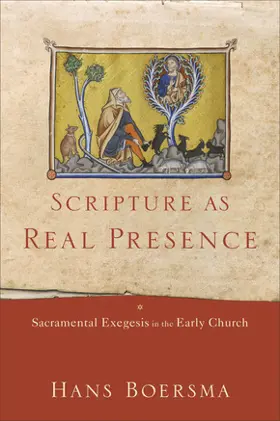

Scripture as Real Presence: Sacramental Exegesis in the Early Church
Pages
336
Publisher
Baker Academic
Published
3/1/2017
ISBN-13
9780801017032
This work argues that the heart of patristic exegesis is the attempt to find the sacramental reality (real presence) of Christ in the Old Testament Scriptures. Leading theologian Hans Boersma discusses numerous sermons and commentaries of the church fathers to show how they regarded Christ as the treasure hidden in the field of the Old Testament and explains that the church today can and should retrieve the sacramental reading of the early church. Combining detailed scholarly insight with clear, compelling prose, this book makes a unique contribution to contemporary interest in theological interpretation.
- Contents
- 1. Patristic Reading
- The Church Fathers on Sacramental Reading of Scripture
- Scripture as Sacrament
- Metaphysics and Hermeneutics: Origen, Hobbes, and Spinoza
- Sacramental Reading in Origen: Discerning Heavenly Patterns
- Irenaeus's Recapitulation as Sacramental Reading
- Retrieving Sacramental Reading: Meaning, Virtue, Progress, and Providence
- Conclusion
- 2. Literal Reading
- Gregory of Nyssa and Augustine on the Creation Accounts of Genesis
- Patristic Interest in Reading by the Letter
- Gregory of Nyssa, On the Making of Man
- Gregory's Literal Reading as Theological
- Augustine's Turn to Literal Exegesis
- Theological Literalism in Saint Augustine
- Conclusion
- 3. Hospitable Reading
- Origen and Chrysostom on the Theophany of Genesis 18
- Interpretation as Hospitality
- Origen: The Son of God at Mamre
- Origen: Hospitality as Allegory
- Chrysostom: Divine Condescension at Mamre and in Scripture
- Chrysostom: Hospitality as Interpersonal Moral Virtue
- Conclusion
- 4. Other Reading
- Melito of Sardis and Origen on the Passover of Exodus 12
- The Exodus: Allegory as Arbitrary Reading?
- Typology in Scripture
- Melito of Sardis, On Pascha
- Origen, Treatise on the Passover
- Conclusion
- 5. Incarnational Reading
- Origen on the Historical Narrative of Joshua
- Allegory and Event
- Origen's Polemical Context
- Scripture as Incarnate Logos
- Mysterii video sacramentum
- History's Rightful Place
- From History to Spirit: Biblical Rationale
- Conclusion
- 6. Harmonious Reading
- Clement of Alexandria, Athanasius, Basil, Gregory of Nyssa, and Augustine on the Music of the Psalms
- Tuning People with the Psalms
- Harmony in the Platonic Tradition
- Harmony in the Early Church
- Restoring Harmony: Virtue and Emotions in the Psalms
- Harmony with the Voice of Christ
- Gregory of Nyssa on the Order of the Psalms
- Conclusion
- 7. Doctrinal Reading
- Athanasius and Gregory of Nyssa on the Wisdom of Proverbs 8
- Spiritual Interpretation and Christian Doctrine
- From Origen to Eusebius
- Athanasius: Interpretive Strategies
- Athanasius: Exegesis 1 and 2
- Gregory of Nyssa: Turning the Peacock
- Gregory of Nyssa: Christ Created, Established, and Born in Us
- Reading Wisdom Sacramentally
- Conclusion
- 8. Nuptial Reading
- Hippolytus, Origen, and Ambrose on the Bridal Couple of the Song of Songs
- Contemporary Readings of the Song of Songs
- Hippolytus: Allegory and Economy
- Origen: Ecclesial and Personal Readings
- Ambrose: Ecclesial Asceticism
- Conclusion
- 9. Prophetic Reading
- Irenaeus, Cyril of Alexandria, Origen, Eusebius, Gregory of Nyssa, Jerome, Ambrose, and Augustine on the Servant Songs of Isaiah
- Prophecy and Fulfillment: A Sacramental Bond
- Edward Pusey's Sacramental Typology
- Looking for Christ in Isaiah's Prophecies
- Christ as the Suffering Servant of Isaiah 53
- Christological Reading and the Wirkungsgeschichte of the Text
- Christological Mystery Hidden in the Servant Songs
- Wounded by Love: Associations of the Chosen Arrow (Isa. 49:2)
- Conclusion
- 10. Beatific Reading
- Gregory of Nyssa, Augustine, and Leo the Great on the Beatitudes of Matthew 5
- Spiritual Interpretation of the New Testament
- Interpreting between Cave and Mountain
- Gregory of Nyssa and Multiplicity of Meaning
- Virtue and Salvation
- Virtue and Interpretation
- Numbering the Steps of Virtue
- Conclusion
- Conclusion
- Indexes